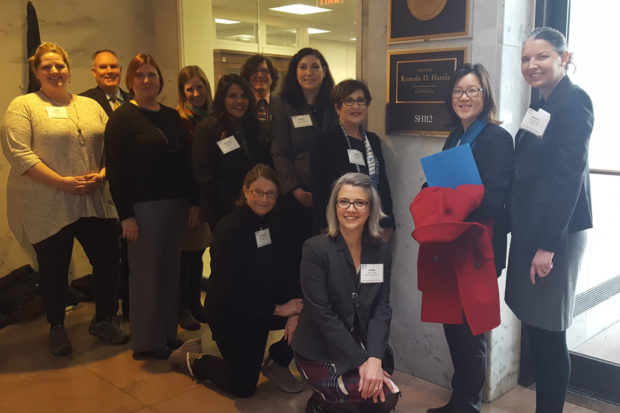In light of the recent political climate in the United States, Chimin Lee Metzler wanted to help the more than 1,000 international students and scholars at Loyola Marymount University. So she traveled to Washington D.C. to meet with elected officials on their behalf.
In this editorial, Chimin Lee Metzler, assistant director of Office for International Students and Scholars, writes about why she was inspired to go to the nation’s capital and what she hoped to accomplish.
[dropcap]I’m not much of a political person. My friends and family will be the first to tell you that I’m the last person to say anything about politics. However, since the presidential election, I’ve had a growing sense of uneasiness.
Taking part in the marches in downtown Los Angeles and demonstrations at the airport helped, but I felt there was more I could do after hearing about the encounters of international students and scholars with the Customs and Border Protection. This confirmed how the election and subsequent Executive Orders affected the population we serve through the Office for International Students and Scholars at LMU.
Our Agenda
In response to this, I participated in the Advocacy Day 2017 with National Association of International Educators (NAFSA) — an organization of which I’m a member. In March, I attended this 2-day program in Washington D.C., where nearly 300 educators representing 38 states came with tools on how to effectively advocate on Capitol Hill. It was there that we met with elected officials and staff to share the three items on our agenda of international education:
- Educating our elected officials on the Value of International Students and Scholars
- BRIDGE Act – encouraging our officials to cosponsor and champion the bipartisan Bar Removal of Individuals who Dream of Growing Our Economy (BRIDGE) Act, a temporary relief from deportation and work authorization for the undocumented and DACA recipients
- Senator Paul Simon Study Abroad Program Act – a grant that allows institutions of higher education to develop programs encouraging a diversity of students and destinations in Study Abroad Programs.
Unique Perspectives
Our 14-person delegation from California met with staff from the offices of California’s U.S. Senators Dianne Feinstein and Kamala Harris, as well as representatives Karen Bass and Ed Royce. We explained that international students and scholars and their families bring significant academic, cultural and economic benefits to the United States. We cited the data compiled by NAFSA, which highlighted the $33 billion and 400,000 jobs international populations contributed to the nation’s economy last year.
In California, international students and scholars contributed $5.2 billion to the economy and supported almost 60,000 jobs. Not only did this population help grow the economy, but they also brought their unique perspectives and shared their rich cultures with us. They’ve also helped the United States be a leader in innovation in the areas of technology and sciences.
Innovative Minds
The new administration’s Executive Order travel ban sends a chilling message to the students and scholars who add so much benefit and diversity to college campuses across the country. We urged our elected officials to make floor statements on the value of international students and scholars and their academic, cultural and economic contributions to the United States.
Countries such as Australia, Canada and China have welcoming immigration policies that attract international students and scholars. The United States cannot afford to lose its competitive edge in pioneering the global workforce, which is built with the help of innovative minds of students and scholars who are open to dialogue and the exchange of ideas across cultures and boundaries.
Welcoming international students and scholars should be a part of a long-term U.S. foreign policy. A positive public statement from our government officials will be important in making the international students feel confident in their decision to come to the United States.
Empowering Experience
Though it was nerve-wracking to be one of the spokespersons of our delegation, I was delighted that the staffers were very receptive to our issues and some offered to collaborate with other officials to make a stronger case. This experience has truly empowered me to gain confidence in fighting for the issues that I believe in, and reminded me that advocacy is personal.
If you are concerned about your friends or your students, who are international students, DACA students or students who want to study abroad but has no means, I highly recommend what Fiona Grugan, the 2017 Advocate of the Year, recommends:
- Save (202)-224-3121 (Capitol Hill Switchboard) in your phone
- Call your senators and congress members (Find out who they are for your district)
- Let them know these issues that are important to you
- Remind them that you are a constituent of their district
- Call them while waiting in line, walking to a grocery store, when you’re stuck in traffic.
As a former international student and an immigrant, I was fortunate enough to meet Americans and others who guided me and advocated for my well-being. I would like to be able to provide what I had benefited from — guidance and advocacy that international students and immigrants are welcome here, and their experiences and skills add to the diversity of American culture and its makeup of the cultural fabric.
By Chimin Lee Metzler, assistant director of LMU’s Office for International Students and Scholars
